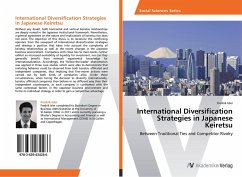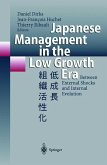Without any doubt, both horizontal and vertical keiretsu relationships are deeply rooted in the Japanese institutional framework. Nevertheless, a general agreement on the nature and implications of keiretsu ties does not exist. The objective of this thesis is to reconcile the conflicting opinions from the viewpoint of international diversification strategies and develop a position that takes into account the complexity of keiretsu relationships as well as the recent changes in the Japanese business environment. Companies with close ties to main banks neither exhibit an increased availability of liquidity for investment, nor can they generally benefit from network experiential knowledge for internationalization. Accordingly, the "follow-the-leader" phenomenon was applied in three case studies which were able to demonstrate that imitating behavior could be observed from both keiretsu affiliated and independent companies, thus implying that first-mover actions were carried out by both kinds of companies alike. Under these circumstances, when facing the decision to diversify internationally, keiretsu affiliated companies then behave in no different way than their independent counterparts, as each company is confronted with the same contextual factors in the Japanese business environment and forms its individual strategy in order to gain a competitive advantage.








